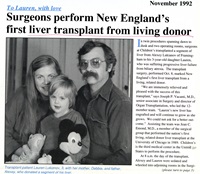 Laurie Lukianov has a more extensive medical history than most people would accumulate in several lifetimes. She spent most of her childhood in a hospital, and remarkably, that’s where the 26-year-old nursing student wants to spend her career.“There is no question in my mind,” she says. “Since I was 3 years old, I wanted to be a nurse.”
Laurie Lukianov has a more extensive medical history than most people would accumulate in several lifetimes. She spent most of her childhood in a hospital, and remarkably, that’s where the 26-year-old nursing student wants to spend her career.“There is no question in my mind,” she says. “Since I was 3 years old, I wanted to be a nurse.”
Born with biliary atresia—a life-threatening liver condition in which the bile duct to the small intestine becomes blocked—Laurie underwent two liver transplants by age 13. Due to her long history of health problems, Laurie has had to overcome more obstacles than the average nursing student. But in many ways, these obstacles make her an ideal fit for the field she wishes to pursue—pediatric transplant.
“The biggest benefit is that I know what they have gone through,” she says.
A groundbreaking transplant
Laurie’s first liver transplant was performed at Boston Children’s Hospital, where a segment of Laurie’s father’s liver was transplanted into his 3-year-old daughter—making her New England’s first liver transplant from a living, related donor and garnering media attention throughout the East Coast, including an interview on ABC’s “Good Morning America.”
The transplant was successful and allowed Laurie to lead what she refers to as “a relatively normal childhood.” However, it was not a fully functioning liver, and she knew it would not be her last.
 “I was in and out of the hospital for liver failure constantly,” says Laurie. “But the hospital became a home to me. I loved going there because I loved the nurses—they painted my nails, brought me to the cafeteria for meals with them and just put in that extra time.”
“I was in and out of the hospital for liver failure constantly,” says Laurie. “But the hospital became a home to me. I loved going there because I loved the nurses—they painted my nails, brought me to the cafeteria for meals with them and just put in that extra time.”
Laurie’s second liver transplant at age 13 at another Boston-area hospital was not any easier than the first. During the two weeks following the transplant, she underwent 13 emergency surgeries and then spent three months in the hospital. Nevertheless, she managed to graduate from middle school, and many of the nurses who had cared for her throughout her childhood attended the ceremony in support.
Laurie’s health improved as the years went by, though not always evidenced by bouts with jaundice and a distended belly. She admits to being painfully shy, a trait that made high school difficult for her. Not to mention, Laurie began her freshman year at a school in a neighboring town away from her friends, because her local high school was undergoing renovations at the time.
“My immune system was so fragile, my transplant surgeons didn’t want me to go there because of the risk of infection from the dust and debris.”
Today, Laurie has very few limitations. She recently completed her first year at Brockton Hospital School of Nursing, with plans to graduate in 2016. She also works another job—“mom” to son Jake.
Badges of courage
Despite the sense of normalcy, reminders of the transplants are still present. Laurie takes daily immunosuppressants to prevent her body from rejecting her donor liver. She takes extra precautions before treating patients who may be at a higher risk for spreading infection. And she still struggles with her abdominal scars.
Last year was the first time Laurie wore a bikini to the beach. Before, she had always felt too self-conscious. But a friend convinced her to take the plunge, and Laurie eventually conceded.
“Of course, people were staring and eventually someone asked, ‘What happened to your belly?’ I joked, ‘I got bitten by a shark.’ ”
Centuries ago, warriors proudly displayed their scars like badges of courage. Laurie Lukianov’s scars have become the marks of her character, which she hopes will help other children on the transplant journey.
Learn more about the Boston Children’s Liver Transplant Program.
